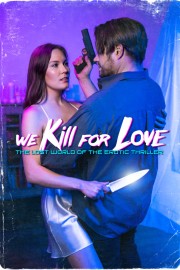We Kill for Love
**This piece was written during the 2023 WGA and SAG-AFTRA strikes. Without the labor of the writers and actors currently on strike, the movies being covered here wouldn’t exist.
When it came to erotica cinema, I always leaned more into the major ones- your “Basic Instincts” and “9 1/2 Weeks” and “Wild Things.” Even when I was at college, I was not one to pick up movies starring Shannon Tweed or feature practically-naked women on the cover. Watching “We Kill for Love,” I’ll admit that I kind of wish I had. The major studios certainly had stars we wanted to see naked, but the direct-to-video erotic thriller gave us more bang for our buck, so to speak. While I do think there are times when his film feels its 163-minute running time too much, I ultimately think director Anthony Penta earns it, not just in how he baits the hook for his documentary, but in how in-depth he explores his subject, its origins, its appeal, and ultimately, why it disappeared. That some of these films are not available is a sign of film preservation malpractice, not because they are high art, but because a significant part of this genre might be lost, and that is always something to be saddened by.
Penta’s voice is on the film’s soundtrack at the beginning, as he shows an archivist trying to piece together the lost remnants of the erotic thriller drama. I was worried that this was just going to be another “Room 237,” which breaks down “The Shining” by giving voice to several prominent theories the film has inspired. I’m not a big fan of that film, because I think it looks like a glorified YouTube video. But then, Penta begins to share the soundtrack with other voices. Historians, filmmakers, actors whom have devoted their careers to this genre. All of the sudden, his film snaps into focus. “We Kill for Love” becomes less a video essay and more of a historical look at a genre best known for its ability to titilate than its ability to make us think. Suddenly, we see this genre in context of the cinema, and times, that led to its creation, and I am fascinated. I will warn you, though- there’s a LOT of nudity in this film, because it was omnipresent in the films of the genre. And God bless it.
Every few weeks, we get someone talk about how sex scenes are not necessary in movies or TV shows. Certainly, some film’s excuses for them are flimsy, but one of the things I think cinema is valuable for is its ability to activate something in our mind that isn’t always served by real life. Erotic cinema provides a chance to explore dangerous ideas and scenarios in a safe environment- from the comfort of our own home; if it turns us on, that’s less because we’d want to necessarily experience those things in real life, and more because the filmmakers understand the potential of what it means for us chemically, and emotionally, to see that happen. Yes, the morality of what’s scene on screen can be questionable, but wouldn’t it be healthier for us to confront those questions because of something a film of TV show explores than acting on something in real life?
Penta’s ability to show us the way the crime films of the ’30s and ’40s- especially the classic film noir titles- became the template of erotic thrillers is especially important, I think, because most of us would not necessarily see the connection between “Double Indemnity” and a film like “Body Chemistry” or “Night Eyes”; certainly, “Body Heat” is a more obvious inspiration- just as “Vertigo” is to “Basic Instinct”- but seeing the speakers make those connections thematically- and narratively- to the great noir of the past gives us a different lens with which to see titles like “Last Call” (a Tweed film), Lou Diamond Phillips’s “Dangerous Touch,” “Sex and Consequences” (with Joan Severance) or “Friend of the Family,” a drama where a family friend comes into town and bangs just about everyone in a family. Everything about this film makes sense in how it explores these films, and this genre. Yes, we still see some movies try and bring back the genre, whether it’s the “Fifty Shades” trilogy or last year’s “Deep Water,” but honestly, I’d rather see more efforts placed towards preserving the films we got in this genre’s heyday (the ’80s and ’90s) before filmmakers try adding to it. That will ensure that filmmakers don’t lose the blueprint of what made the genre so tantalizing at its best before repeating many of the same mistakes it made at the time.










